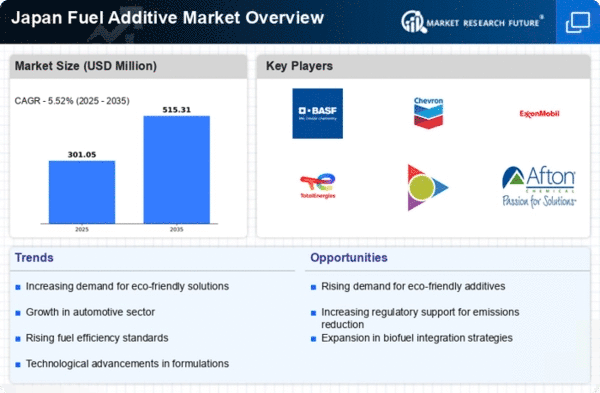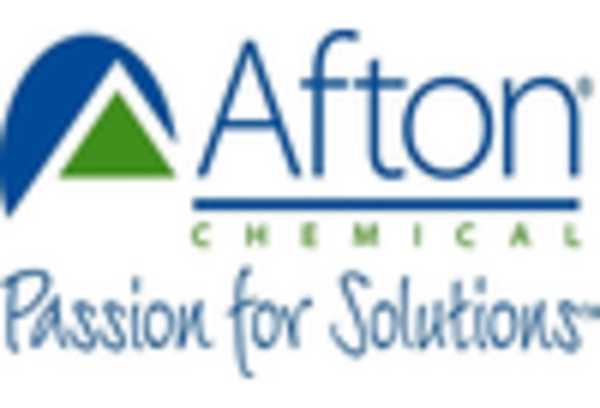The fuel additive market in Japan is characterized by a competitive landscape that is increasingly shaped by innovation, sustainability, and strategic partnerships. Key players such as BASF (DE), Chevron (US), and ExxonMobil (US) are actively pursuing strategies that emphasize technological advancements and environmental considerations. For instance, BASF (DE) has focused on developing bio-based additives that align with Japan's stringent environmental regulations, while Chevron (US) is enhancing its product portfolio through strategic collaborations aimed at improving fuel efficiency. These collective efforts not only drive growth but also foster a competitive environment where companies are compelled to innovate continuously.In terms of business tactics, companies are increasingly localizing manufacturing to better serve the Japanese market, which appears to be a response to the growing demand for customized fuel solutions. The market structure is moderately fragmented, with several key players holding substantial market shares. This fragmentation allows for a diverse range of products and services, yet the influence of major companies remains significant, as they set industry standards and drive technological advancements.
In October Chevron (US) announced a partnership with a leading Japanese automotive manufacturer to co-develop advanced fuel additives aimed at enhancing engine performance and reducing emissions. This strategic move is likely to bolster Chevron's presence in the Japanese market, aligning with the country's push for greener technologies. Such collaborations not only enhance product offerings but also position Chevron as a leader in sustainable fuel solutions.
In September ExxonMobil (US) launched a new line of fuel additives specifically designed for hybrid vehicles, reflecting the growing trend towards electrification in the automotive sector. This initiative underscores ExxonMobil's commitment to adapting to market changes and meeting the evolving needs of consumers. By focusing on hybrid technology, ExxonMobil is likely to capture a significant share of the market as more consumers transition to hybrid vehicles.
In August BASF (DE) expanded its research and development facilities in Japan, aiming to accelerate the development of innovative fuel additives. This expansion is indicative of BASF's long-term commitment to the Japanese market and its recognition of the importance of localized innovation. By investing in R&D, BASF is positioning itself to lead in the development of next-generation fuel additives that meet both performance and environmental standards.
As of November the competitive trends in the fuel additive market are increasingly defined by digitalization, sustainability, and the integration of artificial intelligence. Strategic alliances are becoming more prevalent, as companies recognize the need to collaborate to enhance their technological capabilities. Looking ahead, competitive differentiation is likely to evolve from traditional price-based competition to a focus on innovation, technology, and supply chain reliability. This shift suggests that companies that prioritize R&D and sustainable practices will be better positioned to thrive in the dynamic landscape of the fuel additive market.
















